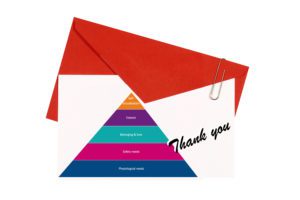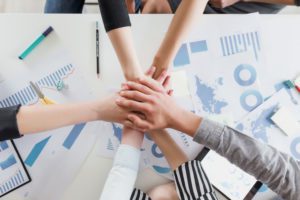
How can a simple gesture give work more purpose?
How can a simple gesture give work more purpose? 1. Send a note: This past
I have a number of High Net Worth and Financial Services coaching clients. Some are fund managers, some are founder-entrepreneurs running multiple businesses, some lead regional or global businesses within very large companies. These are wealthy and powerful people. Of course, Covid-19 has impacted business negatively for many of them, positively for some. At the same time, soaring equities markets have increased personal wealth for most.
As a coach, it’s a privilege to have sense-making, meaning-making and action-oriented conversations with these smart, financially literate people who work at the heart of ‘the system’. I have been in conversation with many of my clients for several years, but talking in 2021 feels different…
In what seems like a sudden shift, many of these confident, well-educated, opportunistic, risk-taking winners seem bewildered and disoriented. In dialogue, they are exploring the end of some old certainties; grappling with new rules, new paradigms, new mindsets – for themselves and in the world around them. It feels like a tipping point.
The Tipping Point
In fact, “tipping point” was exactly the phrase used by one client (founder of a multi-billion dollar fund), as he tried to figure out what the recent Gamestop saga really means. Young retail investors surfed the waves of Reddit and Robin Hood, ‘stealing from the rich’. Their audacity in taking on seasoned professional investors at their own short-selling game had really pulled my client up short. How could he continue winning against people like that; their investing didn’t “make sense”.
Was this just the little guy firing a silly defiant shot across the bow of the markets’ mighty dreadnought? Or was it a paradigm shift in the way markets and investing operate?
The prevailing view of established investors seemed to be that the markets needed protection from these unqualified marauders, and they needed protecting from themselves.Speaking on the same topic, I heard a radio finance pundit deride the motives of those piling money into Gamestop and AMC as “nostalgia, not investing”.
A dictionary definition of ‘Nostalgia’ is “a feeling of pleasure and slight sadness when you think about things that happened in the past.” I remember (without nostalgia) wrestling with my first computer, first mobile phone, first email, first internet foray; I still have to psych myself up to set a new phone. I feel the fear of being left behind, of becoming irrelevant, even as I open my home to a robot vacuum cleaner and ask a speaker to switch my living room lamps on. For my generation (I sit at the oldest end of Generation X), digital will always be an ongoing journey into the great unknown.
I wonder how the past and future connect for my Generation Z, digital native, children (aged 18 and 19)? For them the digital world is normal, easy, so ordinary that it is sometimes even… boring.
The World We Want
My nostalgia is for a childhood world where woods and bikes, dressing up and dens were the primary environments of play. Battles for dominance involved stick guns, skinned knees and hairpulling, not avatars. Our points were tallied in bruises, marbles or how bad the ‘telling off’ was when we got home. Like many parents my age, I tried hard to create some version of that kinaesthetic, sensory childhood for my daughter and son, even as I ‘lost the battle’ to the Virtual World.
My kids are the last generation who will be raised by digital nomads, rather than digital natives. Their world view therefore encompasses both digital and non-digital experience. Now kids like mine are young adult contributors to and consumers of the world…
I have puzzled as my kids bought record players and music on vinyl (to enjoy alongside their Spotify playlists); they seem to like how tactile playing music can be. They love going to the cinema (seemingly for the togetherness, the popcorn, the journey there and back), even though they can (and do) stream hours of content to their phones. My kids’ favourite clothes shopping is ‘vintage’ (second-hand). It seems to hold twice as much meaning for them: a cool outfit and a kindness to the planet. They enjoy(ed) roaming stores and sorting through the racks, but they also shop and swap online.
I feel that GenerationZ (roughly born between 1997 and 2012) is a generation of great hope. As digital natives, they understand the e-world. It is natural, not aspirational, for them, unlike my generation. They also understand its limitations and clearly envisage how they want to integrate the virtual and natural worlds. They aspire to a world that supports digital infrastructure, ecosystems and social systems.
The Past Imperfect
While we Boomers and GenXers currently sit at the top of many corporate hierarchies, GenZ see how hard (rather than smart) we work. They see how we are slaves seeking to master digital, rather than the other way round. They see how we have pursued our own personal gain to a point where many other people can’t afford a roof, or food or healthcare. And they see us rev up on coffee from disposable cups, then chant “Om” from our plastic foam yoga mats, as we try to calm down.
Seeing how torn we are, how we have messed with Maslow’s hierarchy of needs and stretched the wealth gap till the world is at breaking point, they really don’t want what we have.
To me, the Gamestop story seems like yet another way that younger people are telling us that we, not they, are wrong. Their investments were not about nostalgia for the past, but about seeking a better balance in the future. The Reddit-reading Robin Hoods were investing in Gamestop and AMC stock to teach financial predators a lesson, and to make a statement about the world they want to live in.
It strikes me that GenZ want to integrate the digital and the humanistic. They want a world in balance, a planet that sustains all life forms, including the robots. And far from having problems communicating, young people are talking to each other about everything, all the time.
Catching On
My colleagues at Holos Change have long said “innovation follows youth”. Here in early 2021, my middle-aged, high net worth clients are catching on to the wisdom, creativity, connectedness and change-hunger of the young. For decades, my generation has banked on the adage that ‘information is power’. For GenZ, information is freeflowing, instant and powerful. And they are choosing to wield that power.
Jeff Bezos is 57, Bill Gates is 65, Rebecca Henderson is there or thereabouts. Like many others, these Boomer/GenX business and thought leaders are wrestling with meaning; trying to figure out how to create progress while simultaneously halting and reversing the damage already done. Gamestop/AMC investors, our kids and young employees have been instrumental in raising all our middle-aged eyes from our screens and forcing us to look at the bigger picture of our planet and our societies. We should thank them, not patronise them.
Rising Magic
Covid has created a pause. Like my clients, I am asking big existential questions. I can really feel my own mortality, the scale of our planet, all that unites and divides us. The world feels like it’s teetering on the edge of an abyss. Like all ageing humans, we need to strengthen our balance or we risk falling over and breaking something.
Instead of looking for a fairy godmother to sprinkle magical hope into the new year, wishing for a bull run in the Year of the Ox, or trying to corral a unicorn into our personal portfolios, we should see the magic in the ideas, aspirations and actions of the rising generation.
The young have important lessons to teach us. They are not nihilistic, naïve or nostalgic, they’re right on the money.
================================================================
References and Readings:
================================================================
CONNECT WITH US:
If you’re navigating your way into the future, and it could help to work with an Executive Coach, please reach out to me, Sally Dellow, as:
Email: [email protected]
Linkedin: linkedin.com/in/sallydellow
Twitter: @DramDiff

How can a simple gesture give work more purpose? 1. Send a note: This past


Which Witch Will YOU Stop Ducking? Last week I saw a wonderful post on Facebook


(…or how to stop hating your co-workers) Sometimes it happens like this: you’re merrily going